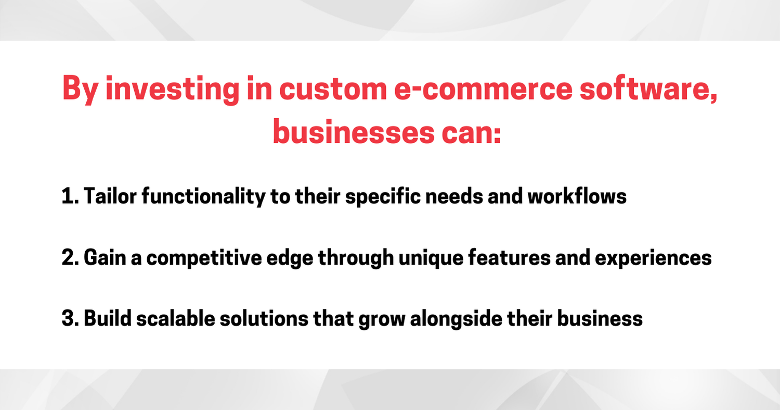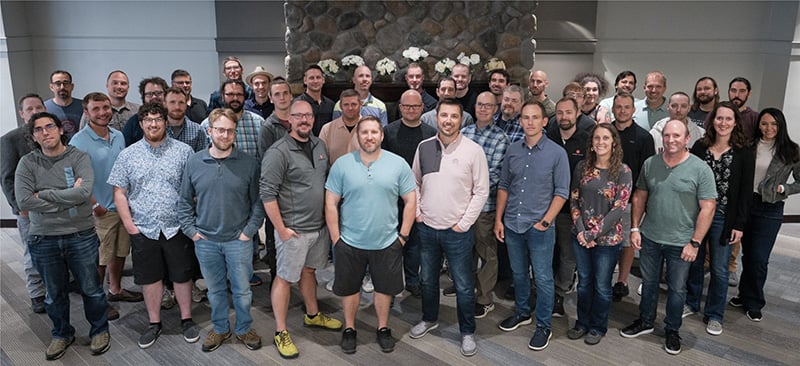In today's digital marketplace, e-commerce businesses face fierce competition and ever-evolving consumer expectations. To stay ahead of the curve, many companies are turning to custom software development to create unique, efficient, and engaging online shopping experiences that off the shelf solutions just can’t match. This article explores the benefits of tailored e-commerce solutions, key features to consider, and how to choose the right development partner for your business needs.
Revolutionizing Online Retail with Custom Solutions
The e-commerce landscape is constantly shifting, with new technologies and consumer behaviors emerging at a rapid pace. According to a report by Statista, global e-commerce sales are projected to grow to 7.4 trillion dollars by 2025. Safe to say that staying competitive in this rapidly expanding market is more important than ever. Off-the-shelf software solutions may struggle to keep up with these changes, potentially leaving businesses at a disadvantage. Custom software development offers a powerful alternative, allowing e-commerce companies to create platforms that precisely match their unique vision and requirements.

By investing in custom e-commerce software, businesses can:
- Tailor functionality to their specific needs and workflows
- Gain a competitive edge through unique features and experiences
- Build scalable solutions that grow alongside their business
Let's explore these benefits further and see how they can transform your online retail presence.
Tailoring the Shopping Experience
Tailored Functionality
One of the primary advantages of custom e-commerce software is the ability to create a platform that aligns perfectly with your business processes and customer needs. Unlike generic solutions that force you to adapt your operations to their limitations, custom software can be built from the ground up to support your unique workflows.
For example, consider Warby Parker, the online eyewear retailer. They developed a custom "Virtual Try-On" feature that uses augmented reality to allow customers to see how different frames look on their face using their device's camera. This innovative solution addresses a major pain point in online eyewear shopping – the inability to try on glasses before purchasing. By investing in this custom feature, Warby Parker not only enhanced the user experience but also reduced return rates and increased customer satisfaction.

(Image Source: Warby Parker)
The Tile Shop is another great example of a company that leveraged custom e-commerce functionality to improve their business. They needed a website that could integrate with their SAP ERP system to automatically update inventory levels and make location-based recommendations. By partnering with Emergent Software to build a custom solution on the Sitecore platform, they were able to launch a beautiful, high-performing website with advanced features in just six months.
Rent the Runway, a designer clothing and accessory rental service, is another prime example of custom e-commerce functionality. They developed a complex inventory management system that tracks the real-time availability of items, their cleaning status, and even how they fit different body types based on customer feedback. This level of customization enables them to offer a seamless rental experience that would be impossible with generic e-commerce software.
Competitive Advantage
In a crowded marketplace, standing out from the competition is crucial. Custom software enables e-commerce businesses to differentiate themselves by offering unique features and experiences that generic platforms simply can't match.
Family Formation, a company with a 30-year history, partnered with Emergent Software to take their direct marketing strategy to the next level. Emergent Software designed a sleek new website with a simple online buying experience and easy content management using Umbraco CMS. The website integrates with Family Formation's custom eCommerce solution, built by Emergent Software, which supports their unique product catalog and distribution model. The end result allows Family Formation to easily update their content, reach families worldwide, and provide an impressive, easy-to-navigate site for their customers.
Scalability
As your e-commerce business grows, your software needs will inevitably change. Custom solutions can be designed with scalability in mind, allowing you to easily add new features, handle increased traffic, or expand into new markets without overhauling your entire system.
Take Shopify, for instance. While it's now a platform for other businesses, Shopify started as a custom e-commerce solution for selling snowboarding equipment. As the company grew and pivoted, their custom software allowed them to scale from a single online store to a platform supporting over a million businesses worldwide.
From Browse to Buy: Optimizing the Customer Journey
To create a truly exceptional online shopping experience, certain key features should be considered when developing custom e-commerce software. Let's explore some of the most impactful elements:
Personalized Product Recommendations
Leveraging customer data and artificial intelligence can dramatically improve the shopping experience by providing tailored product suggestions. Netflix's recommendation algorithm is a prime example of this concept in action. By analyzing viewing history, ratings, and even the time of day users watch, Netflix suggests content that keeps subscribers engaged and reduces churn.
In the e-commerce world, similar principles can be applied to product recommendations. An online personal styling service, for instance, uses a combination of AI and human stylists to recommend clothing items to their customers. Their custom algorithm considers over 85 different attributes per item, including size, style, and fit preferences, to create highly personalized selections for each customer.
Streamlined Checkout Process
A smooth, efficient checkout process is crucial for reducing cart abandonment and increasing conversions. Amazon's one-click ordering system is perhaps the most famous example of checkout optimization, allowing customers to complete purchases with a single action.
While not every business needs (or is legally able) to implement one-click ordering, custom software can streamline the checkout process in numerous ways. An example from the online fashion retail space shows how a custom checkout system can remember customer details, offer multiple payment options, and provide clear progress indicators. This user-friendly approach has helped maintain a lower-than-average cart abandonment rate in the highly competitive fashion e-commerce space.
Multiple Payment Options
To cater to diverse customer preferences and global markets, it's essential to offer a variety of payment methods. Custom e-commerce software can be designed to integrate seamlessly with multiple payment gateways, allowing customers to pay using credit cards, digital wallets, bank transfers, or even cryptocurrencies.
Mobile Optimization
With more than half of all internet traffic now coming from mobile devices, a responsive, mobile-friendly design is no longer optional—it's a necessity. Etsy's mobile app is an excellent example of mobile optimization done right, offering a smooth, intuitive interface that makes browsing and purchasing easy on smartphones and tablets.
Etsy's app includes features like image zoom, easy-to-use filters, and a simplified checkout process optimized for smaller screens. The app also integrates seamlessly with device features like cameras (for easy shop banner uploads) and push notifications (for order updates), enhancing the mobile experience for both buyers and sellers.
Choosing a Partner to Future-Proof Your E-commerce Platform
Investing in custom software development is a significant decision, and choosing the right development partner is crucial to the success of your project. Here are key factors to consider:
Technical Expertise
Look for a development team with a deep understanding of the latest e-commerce technologies and best practices. They should be well-versed in areas such as secure payment processing, data protection regulations, and emerging trends like augmented reality for product visualization.
For example, when Wayfair decided to implement their "View in Room" AR feature, they partnered with a development team experienced in both e-commerce and augmented reality technologies. This expertise was crucial in creating a seamless, user-friendly feature that significantly enhanced the shopping experience for furniture and home decor items.
Industry Experience
A development partner with a proven track record in e-commerce can provide invaluable insights and help you avoid common pitfalls. Ask for case studies or references from previous e-commerce projects to gauge their expertise in your specific industry.
For instance, when Glossier, a beauty brand that started as a blog, decided to launch their e-commerce platform, they chose a development partner with extensive experience in both content management and e-commerce. This expertise helped them create a seamless integration between their content-driven marketing approach and their online store, contributing to their rapid growth and success.
Post-launch Support
The launch of your custom e-commerce platform is just the beginning. Ongoing technical support and maintenance are crucial to ensure your software continues to perform optimally and evolve with your business needs. Choose a development partner who offers robust post-launch support and has a clear plan for future updates and enhancements.
When businesses work with Emergent Software for their custom e-commerce needs, they can expect exceptional customer service and access to development teams that provide up to 24/7 support and regular system health checks, ensuring that their custom e-commerce platform remains robust and responsive to changing market conditions and customer needs.
Conclusion
Custom software development offers e-commerce businesses a powerful tool for creating unique, efficient, and engaging online shopping experiences. By tailoring functionality to your specific needs, gaining a competitive edge through innovative features, and building scalable solutions, you can position your business for long-term success in the digital marketplace.
Emergent Software’s robust custom software development offering makes us the ideal partner to help you achieve your e-commerce goals. Reach out to us today to start the conversation!
Frequently Asked Questions
What is custom e-commerce development?
Custom e-commerce development involves creating a unique, tailored online store to meet specific business requirements and user needs.
What is e-commerce software development?
E-commerce software development is the process of creating software applications and systems to support online buying and selling.
What kind of software solution do you need in e-commerce?
The type of e-commerce software solution needed depends on factors such as business size, products sold, target audience, and desired features.
How to develop an e-commerce website?
Developing an e-commerce website typically involves planning, designing, developing, testing, and launching the site, often with the help of experienced professionals.






